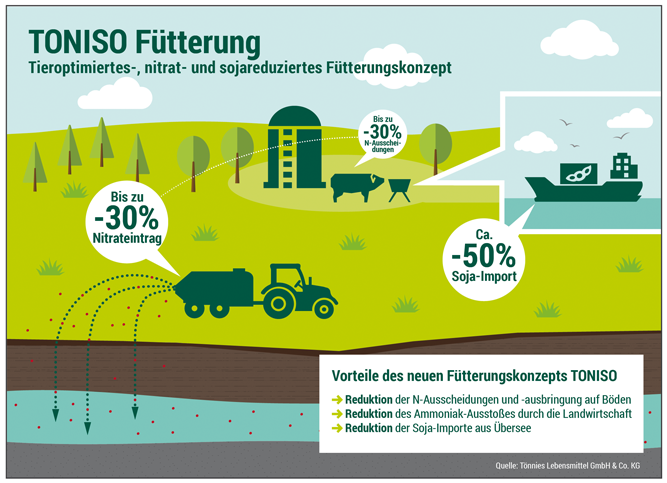New feeding concept significantly reduces nitrate and soy use

Rheda-Wiedenbrück, January 15.01.2019, 30 - Milestone in the sustainable development of livestock husbandry: Josef Bunge, longstanding and experienced feeding advisor at the Chamber of Agriculture in North Rhine-Westphalia, has developed a new and innovative feeding concept. As a result, up to 50% less nitrogen could be produced in livestock farming and at the same time the proportion of soy in animal feed could be reduced by up to XNUMX%.
Up to 30% less nitrogen accumulation is possible because the concept significantly reduces the nitrogen excretion of the livestock (including the phosphorus excretion) via the manure. Application of animal origin to the soil. It can therefore also lead to a reduction in N inputs into the water, ”says Josef Bunge from the North Rhine-Westphalia Chamber of Agriculture. "Ultimately, it also serves to protect the groundwater".
It also serves to reduce ammonia emissions from agriculture from the point of view of climate protection. Within the EU-NERC directive, Germany has committed itself to reducing its ammonia emissions by 2030% by 2005 compared to the base year 29. Neither is it possible to convert nitrogen that is not fed into ammonia.
Another point of discussion when feeding farm animals is the soy content in the feed. The aim of the feeding concept is to roughly halve the proportion of soy in the piglet and pre-fattening feed; under certain conditions, the use of soy can be completely dispensed with in the final fattening. This means that the proportion of soy in the entire fattening population can at least be reduced by more than 50%. With broad implementation in agriculture, the necessary soy imports from overseas will be reduced considerably - 1,75 million tons of soy imports to Germany per year could be eliminated.
In order to still be able to meet the animal's amino acid requirements while saving soy meal, a package of measures is used to change the composition of the supplements and mineral feed, whereby in particular free amino acids are used as supplements, which are 100 percent available to the animal.
The reduced protein content in the feed protects the animals' metabolism, as the animals no longer have to excrete the excess nitrogen, which is a strain on the metabolism. This can reduce water consumption and thus also the amount of slurry that arises.
The implementation of this concept took place, among other things, on agricultural delivery companies of the Tönnies company. The slaughter yields were continuously checked and controlled at Tönnies. Good or non-declining results give the Tönnies company the reason to push this innovative feeding concept with its contractual partners. In this context, it is referred to as "TONISO" feeding (animal-optimized, nitrate and soy-reduced feeding concept).
“This is a real breakthrough in making animal husbandry sustainable for the environment and climate. The potential for nitrate reduction is enormous. We will do everything we can to implement the concept across the board together with our suppliers in the future, ”says Dr. Wilhelm Jaeger, head of the agriculture department at Tönnies.
Several thousand pigs a week are currently being delivered to Tönnies in Rheda-Wiedenbrück, which have already been fattened according to the innovative feeding concepts. This number is now expected to increase continuously. "We are convinced that with the TONISO concept we are making a major contribution to the sustainable development of livestock husbandry in Germany," says Dr. Hunter.

Source: Tönnies.
